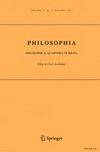自然概念的多样性
IF 0.5
4区 哲学
0 PHILOSOPHY
引用次数: 0
摘要
本章要讨论的概念是那些出现在人类日常思维和语言中的概念--即概念使用的 "自然史"。虽然许多概念似乎是由相似性关系构成的,这使它们适合在概念空间等中建模,但日常使用的其他概念可能是由不同的关系构成的。这些概念包括抽象概念、本质主义种类、自然种类以及逻辑或数学概念。我将讨论这些不同形式的概念的不同来源、用途和认识论基础,并根据其验证来源提出一个三级概念等级体系。本文章由计算机程序翻译,如有差异,请以英文原文为准。
Varieties of Natural Concepts
The concepts to be considered in this chapter are those that occur in everyday common human thought and language – the “natural history” of concepts in use. While many may appear to be constituted by similarity relations, which make them suitable for modelling in conceptual spaces for example, other concepts in everyday use may be differently constituted. These concepts include abstract concepts, essentialist kinds, natural kinds, and logical or mathematical concepts. I discuss the different sources, uses and epistemological bases of these different forms of concept, and propose a three-level hierarchy of concepts based on their sources of validation.
求助全文
通过发布文献求助,成功后即可免费获取论文全文。
去求助
来源期刊

PHILOSOPHIA
PHILOSOPHY-
CiteScore
0.90
自引率
20.00%
发文量
141
期刊介绍:
Founded in 1971, Philosophia is a much-respected journal that has provided a platform to many well-known philosophers, including Kenneth Arrow, A.J. Ayer, Roderick Chisholm, Bas van Fraassen, William Frankena, P.T. Geach, Alan Gewirth, Jaakko Hintikka, Richard Popkin, W.V.O. Quine, Gilbert Ryle, Marcus Singer, Peter Singer, J.J.C. Smart, P.F. Strawson, and many others. Philosophia also published papers of Ludwig Wittgenstein and Rudolf Carnap.
Philosophia is an international journal in scope, submissions and readership. The journal publishes contributions fitting within various philosophical traditions, but manifests a preference of the analytic tradition in the broad sense of commitment to clarity and responsibility.
Besides papers in the traditional subfields of philosophy and its history, Philosophia also publishes work on topical subjects such as racism, silence of God, terrorism, the nature of philosophy, emotion, AIDS, scientific discovery, punishment, modality, and institutional theory of art.
Philosophia welcomes a wide range of contributions to academic philosophy, covering all fields of philosophy. Contributions to the journal may take the form of topical papers, philosophical surveys of literature, symposia papers, short discussion notes, puzzles, profiles, book reviews and more extensive critical studies of new books. The journal includes a ''books revisited'' section where a book and its impact are reconsidered a decade or more after its appearance. Double-blind review procedure The journal follows a double-blind reviewing procedure. Authors are therefore requested to place their name and affiliation on a separate page. Self-identifying citations and references in the article text should either be avoided or left blank when manuscripts are first submitted. Authors are responsible for reinserting self-identifying citations and references when manuscripts are prepared for final submission.Please read our Editorial Policies carefully before you submit your paper to this journal https://www.springer.com/gp/editorial-policies
 求助内容:
求助内容: 应助结果提醒方式:
应助结果提醒方式:


